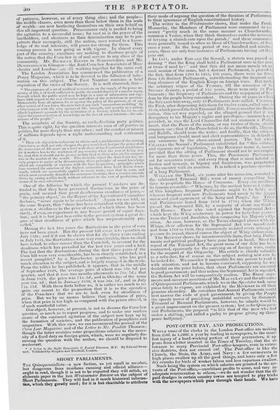SHORT PARLIAMENTS.
TUE Quinquenisialists—a new faction, as yet small in number, but dangerous from insidious cunning and official alliance— ought to read, though it is not to be expected they will relish, an elaborate paper in the last 1Vestminster Review on the subject of Short Parliaments. They will find in it much historical informa- ton, which they greatly need; for it is but charitable to attribute
their mode of arguing the question of the duration of Parliament, to their ignorance of English constitutional history.
The writer in the Westminster shows, that under the Fetch: Monarchy, the Members of Parliament were summoned to Seta money " pretty much in the same tnanner as Churchwarden summon a Vestry, when they think themselves under the necessity; of levying a church-rate upon the parish ;" and these summonsel were generally issued as often as those of Churchwardens, at lea. once a year. In the long period of two hundred and nineteei years, there are only four instances of Parliaments having sat the.,1 year out.
In 1311, under EDWARD the Second, a statute was passed or daining " that the King shall hold a Parliament once in the year or twice if need be:" and that this did not mean merely an an- nual session of the same, but a distinct Parliament, is proved b\ the fact, that from 1299 to 1485, 186 years, there were no fewer than 136 distinct Parliaments, notwithstanding the frequent and long absences of the English Kings on foreign wars. But under the arbitrary reigns of the TUDORS, till the accession of thy STUART dynasty, a period of 118 years, there were only 2s Par- liaments; the frequency of Parliaments and the enjoyment of free- dom by the people being coincident. During the 86 years in which the STUARTS bore sway, only 19 Parliaments were called. Cu Ani.Es the First, after dispensing with them for twelve years; called one, in 16 -10, which passed the first Triennial Bill. Four years after t he Resto- ration, this act was repealed, on the alleged ground that it was derogatory to his Majesty's rights and privileges,—inasmuch as it provided, in case the Lord Chancellor did not summon a Parlia- ment, that the Peers of the realm, or any twelve of them, should summon one; that if the Peers failed to do so, the Sheriffs, Mayors, and Bailiffs, should issue the writs ; and finally, that the citizeni and burgesses should meet and elect representatives in default of any summons by the above-named parties. The bill which CietRLES the Second's Parliament substituted for " this salutary and vigorous act of legislation," as the Reviewer terms it, merely provided that the sitting of Parliament should not be interrupted for more than three years. This, the Pensionary Parliament, sat for seventeen years; and every thing that is most hateful in faction and tyranny, in bigotry and fanaticism, was perpetrated in the country with its sanction. It is indeed a precious spechnen of a long Parliament. Wiwam the Third, six years after his accession, assented t, the celebrated Triennial Bill ; want of money compelling hilt thus to propitiate the House of Commons. Every t ne recollects its famous preamble—" Whereas, by the ancient laws and statute. of this kingdom, frequent Parliaments ought to be held ; whereas frequent and new Parliaments tend much to the happy union and good agreement of the King and People," Sac. Trien- nial Parliaments lasted from 1694 to 1716; when the 11-hie, passed the Septennial Bill, by a majority of about one third of both Houses. Those who voted against the Septennial Act- hich kept the Whig aristocracy in power for forty-four-years- were the Tories and ''Jacobites, then composing his Majesty's Op- sition. As soon, however, as the Tories changed places with the Whigs, their affection for the Septennial Act was manifested; and from 1760 to 1830, they strenuously resisted every attetapt procure its repeal, then of course the object of Whig endeavours. The Reviewer shows, by incontrovertible facts, that long Parlia- ments and political profligacy hare gone hand in hand. Since the repeal of the Triennial Act, the great mass of our debt has been contracted, apparently for the carrying on of foreign wars, really for the support of the Oligarchy-. his article is chiefly valuable as a refresher, for of course on this subject nothing new can be
be looked for. We consider it impossible for any person to read it with attention, and not to become convinced, supposing he was doubtful on the point before, that short Parliaments are essential to good government; and that unless the Septennial Act is repealed, the Reform Act will be comparatively useless. Time flimsy argu-
ments and incorrect assertions of Mr. MACAULAY and the advocates of Quinquennial Parliaments, which we in the Spectator took some pains lately to expose, are exhibited by the Reviewer in all their
genuine absurdity. He considers that Annual Parliaments would best answer time ends of good government, by giving the People the speedy power of punishing unfaithful servants by dismissal. Triennial or Biennial Parliaments, however, he admits would be a great improvement on time present system ; but as for Quinquen- nial Parliaments, the proposal "is like that of the man who had stolen a shilling, and called a parley to propose giving up three- pence-halfpenny."






















 Previous page
Previous page